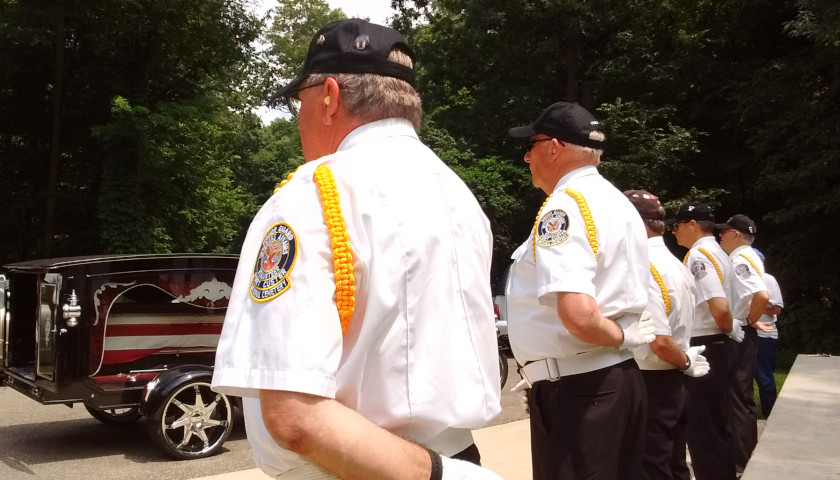AUGUSTA, Michigan – On Friday, a funeral cortege left Otsego, traveling through rolling countryside to honor a Vietnam veteran at Fort Custer National Cemetery. His unclaimed body had occupied a pauper’s grave in Texas since 2016.
Veterans, area residents and school children attended, including fellow Air Force veteran and current State Rep. Steve Johnson (R- Wayland).
 “Why did I come? I’m a veteran.” A local Marine veteran told of his Army son in Afghanistan, and how much our great country owes to those who served in the past. “Everyone who lives here should give two years.”
“Why did I come? I’m a veteran.” A local Marine veteran told of his Army son in Afghanistan, and how much our great country owes to those who served in the past. “Everyone who lives here should give two years.”
‘A Good Friend’
When 65-year-old George Ferrocarril died in November, 2016, he was out of town doing a contract job, staying at a motel in Texas.
“No one should die alone like he did.” Fred Rosen attended the memorial service from New York. He remembers George as a good friend during their teen years, cackling with laughter playing poker in Brooklyn.
“We lost contact in the 1980s. I had no idea he was missing until Karen put the alert out on George’s Facebook page, asking if anyone knew where he was.”
George was working on quality control for the Space Shuttle in Kalamazoo when he met retired MI Army National Guard sergeants Karen Damvelt and William Geresy through a shared hobby.
“He loved planes and trains,” said Geresy, who lives in Plainwell, and remembers the pleasure of getting his friend’s emails while serving overseas.
Geresy, Damvelt, and Rosen worked together to find their friend.
“I never expected to use my professional skills for such a purpose,” said Rosen, a best-selling true crime author. “I checked police reports, and found him. Just to be sure everything was on the up and up, I requested the toxicology. He had been dead at least 48 hours. Heart problems.”
George had been married and divorced, with no children, Rosen said. “Tarrant County Police never bothered to check and see if he was a veteran. Buried him in potter’s field.”
That didn’t sit right with Geresy. “In the military, we have a saying, ‘Leave no fallen comrade behind.’ We decided to get George sent to Michigan for proper burial.”
“Operation George” took George’s friends through a bureaucratic nightmare.
 The deceased veteran, born in New York, had legal residence in Illinois, but was buried in Texas. His only Michigan ties were friends and work history. No jurisdiction and no level of government seemed able to help.
The deceased veteran, born in New York, had legal residence in Illinois, but was buried in Texas. His only Michigan ties were friends and work history. No jurisdiction and no level of government seemed able to help.
Geresy contacted them all – Veterans Administration, congressmen, the White House, state officials, city halls, veterans groups, military bases. Many never even returned his calls.
‘The Real Heroes made confetti of Red Tape’
To applause from the crowd of about one hundred at Friday’s ceremonies, Geresy credited “the real heroes, those who never met George,” but still helped right the wrongs done to him.
Fellow American Legionnaire William Townsley, a lawyer in George’s hometown of Danville, Illinois, helped get the estate into probate, which named Geresy co-administrator. Disposing of the estate, including a full Lionel train layout, took many more months.
The office of Sen. Ted Cruz (R-TX) referred Geresy to Texas State Senator Beverly Powell (D-Fort Worth). Her aide, Jimika Allison, coordinated with Lezlie Kurtz of the Willed Body Program to complete all the paperwork required for exhumation, cremation and transport. Area veterans provided financing and an informal honor guard.
“These ladies have made confetti of red tape,” said Geresy, who had begun to think it was all an impossible dream.
“We need to take action in the future so that no more Veterans are dishonored in death … to see if this person was a Veteran… to use the technology of social media and cell phones to find their friends. …We enjoy our freedom today because of their service yesterday. For that we, this nation, owe our Veterans proper honors….”
– Sgt. William A. Geresy, USAF (Ret) remarks at the memorial service for George Ferrocarril
 “Why dig him up, go through all that trouble, bring him here?” Rosen asks. “Because everyone was here – everyone who cared about him.”
“Why dig him up, go through all that trouble, bring him here?” Rosen asks. “Because everyone was here – everyone who cared about him.”
Who was George?
Even with George’s body coming to a final resting place, questions remained.
“George had black skin; he used to say he was Mexican. We didn’t care what color he was, but we knew his mother was Italian.” Rosen says that Matthew Mischler, another friend from poker days, researched George’s genealogy a few months ago. His father was a West Indies seaman who briefly made port in New York. “George never knew his father.”
George served his country under his mother’s name of Hughes, but changed his name after leaving the Air Force. Was “Ferrocarril,” Spanish for “railway,” another expression of his love for trains?
“I never asked him,” says Geresy regretfully. “It never came up.”
Geresy expects to receive the final paperwork soon, showing that George’s two names belong to the same person.
– – –
Abigail Nobel is a reporter for The Michigan Star.
Sources for this report include over thirty emails sent by William Geresy over the past two years.





